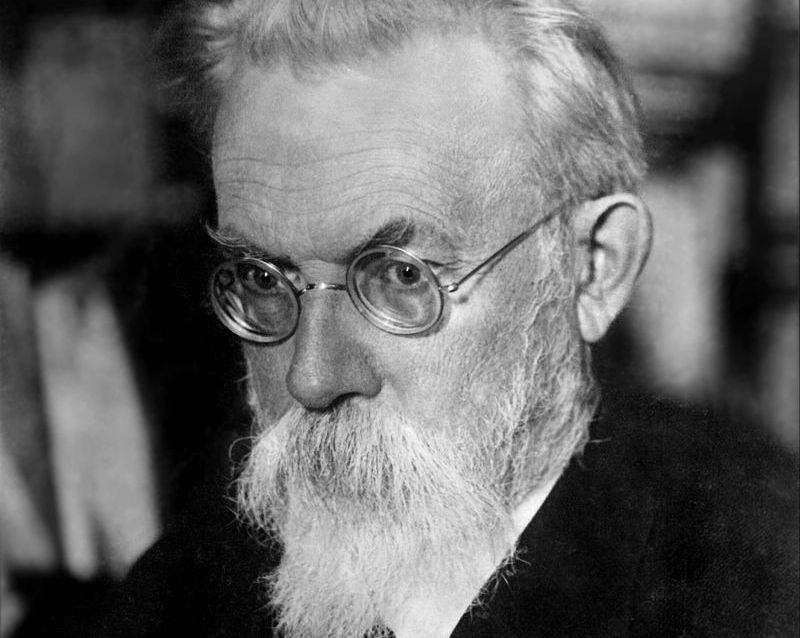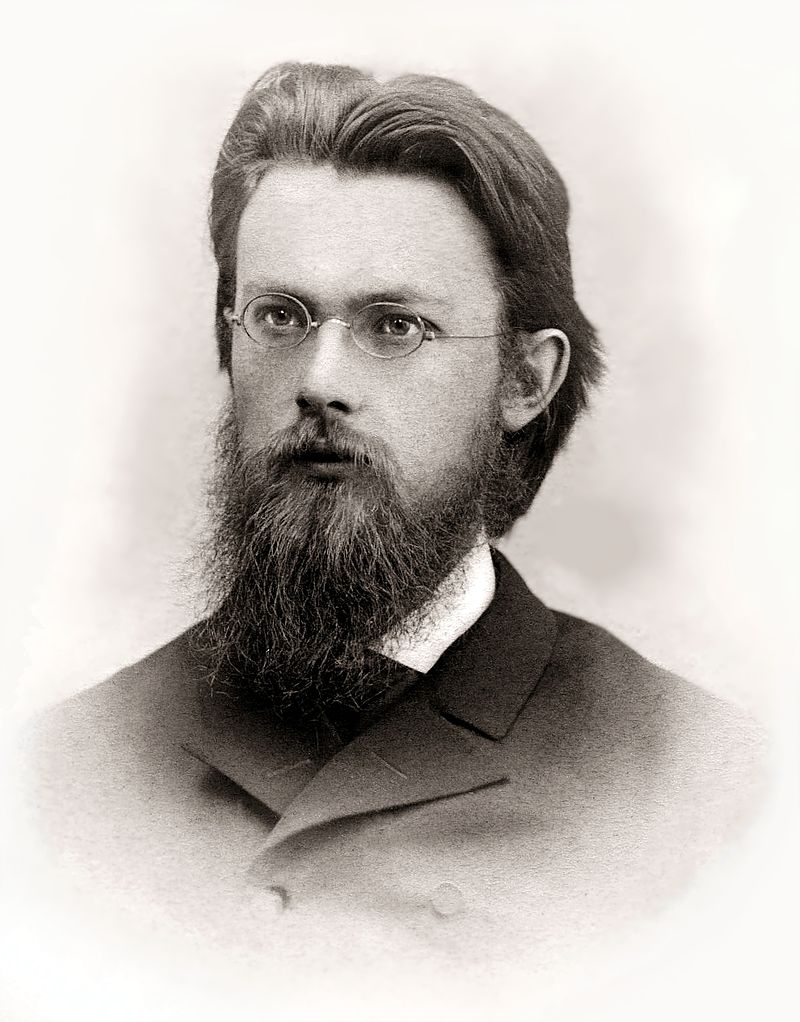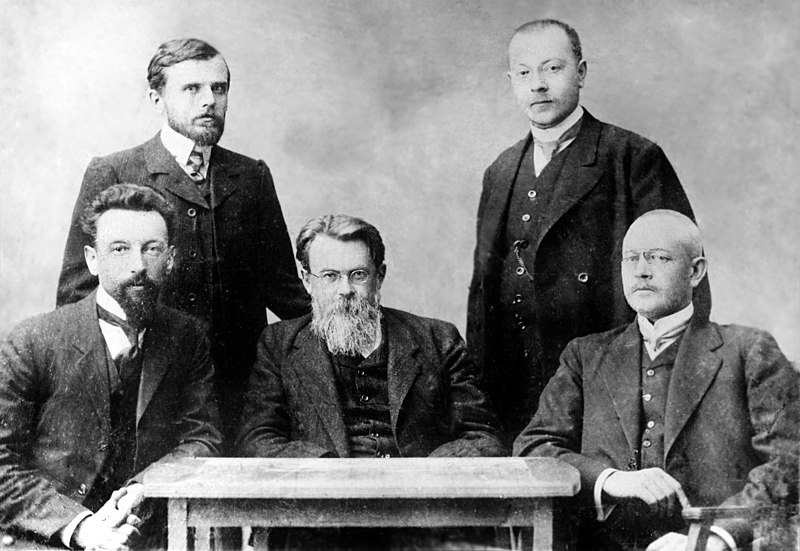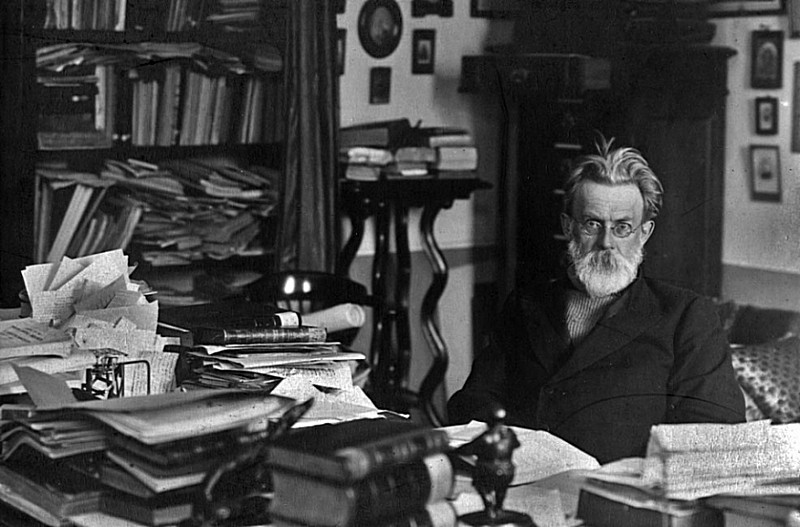Living matter gives the biosphere an extraordinary character, unique in the universe... Cosmic energy determines the pressure of life that can be regarded as the transmission of solar energy to the Earth's surface... Activated by radiation, the matter of the biosphere collects and redistributes solar energy, and converts it ultimately into free energy capable of doing work on Earth...
A new character is imparted to the planet by this powerful cosmic force. The radiations that pour upon the Earth cause the biosphere to take on properties unknown to lifeless planetary surfaces, and thus transform the face of the Earth... In its life, its death, and its decomposition an organism circulates its atoms through the biosphere over and over again.
Vladimir Vernadsky, Biosfera, 1926
Anna Efremova
Vladimir Vernadsky, a prominent scholar and thinker, the founder of a number of scientific schools and even such a new science as geochemistry, was born 160 years ago, on March 12, 1863. In the course of his long life, he was a member of the Imperial St. Petersburg Academy of Sciences, as well as of the Ukrainian and the USSR Academies of Sciences.
Mr. Vernadsky's studies were ahead of their time. In many ways, his ideas became the foundation of the contemporary ecology movement. He diligently researched crystallography, mineralogy, geology, and geochemistry. He was interested in soil science, biology, radiology, biogeochemistry, paleontology, meteorite research, and philosophy, as well as in the history of Russian science. He always had a proactive approach to life, helped the people in need, never betrayed his close ones, and was one of the notable representatives of the liberal movement in Russia in the 19th and early 20th centuries.
“My aim is the cognition of all that is currently attainable by a human being consistent with his capabilities (and specifically mine) and with the age. Nevertheless, I want to expand, at least to some extent, the knowledge pool, and enhance the human situation even a little. To my regret, these days, it is not only scientific knowledge and its application to the struggle with nature that such an enhancement depends on. There is also the struggle with people and their political activity," said 19-year-old Vladimir Vernadsky. The above words are the best description of his view of life and people, which he carried throughout his entire life.
Becoming a Scientist
Vladimir Vernadsky was in St. Petersburg. He belonged to a noble family. His father was an actual state councilor and descendant of a Zaporozhye Cossack petty officer. Vladimir Korolenko, a famous writer, was Vladimir's second cousin.
He was an inquisitive boy who became fond of reading at an early age and read most books in his father's library. The family moved to Kharcov because of the uncongenial climate in St. Petersburg. Vladimir went to the first grade of the Public School there. However, the Vernadskys returned to the capital later on, and Vladimir finished the First St. Petersburg Public School as one of the top students.
He was admitted as a student to the Natural Sciences Department of the Physics and Mathematics Faculty of St. Petersburg University in 1881.
Vladimir Vernadsky's interest in mineralogy and crystallography was inspired by Vasily Dokuchaev, an outstanding geologist and soil scientist. Vernadsky embraced and elaborated on Mr. Dokuchaev's ideas about the oneness of the Earth's nature and the integrity of knowledge. Andrey Beketov, a prominent botanist, was also his teacher. Furthermore, he was taught chemistry by Dmitri Mendeleev.
Having graduated, Vladimir Vernadsky stayed in the university to prepare for a professor degree and became a custodian of the Mineralogical Study.
The promising young scientist was seconded abroad in 1888. For two years, he worked in the chemical and crystallographic laboratories of Italy, Germany, France, England, and Switzerland. He attended the International Geological Congress in London and was elected a corresponding member of the British Association of Sciences. Afterward Mr. Vernadsky worked at the Ecole Supérieure des Mines (Paris School of Mines) and at the Collège de France in Paris. He was elected a member of La Société Française de Minéralogie (French Mineralogical Society).
Having returned to Russia, Vladimir Vernadsky relocated to Moscow and started his scientific and teaching activities at Moscow University. He and his students undertook numerous mineralogical expeditions. They visited the Urals, Crimea, Ukraine, the North Caucasus, Transcaucasia, Poland, and central Russia.
It was the time when Mr. Vernadsky was engaged in serious research work. He wrote and published a textbook on crystallography, and also actively pursued self-education by studying history and philosophy.
New Science
Vladimir Vernadsky was one of the first scientists to question the origin of minerals. Back then, researchers generally believed that mineralogy was essentially a descriptive discipline. They did their best to define the properties of stones and categorize them.
Mr. Vernadsky suggested an entirely different perspective. He was interested in the origin of rocks and the regularities of their occurrence in the Earth's crust. Thus, modern mineralogy was faced with a new objective, namely, to explain the evolution of minerals. Vladimir Vernadsky developed their new classification based on the properties of carbon and silicon species, which are the most widespread elements in the Earth's crust.
Russia hosted the 12th Congress of Naturalists in 1909. Mr. Vernadsky made the report on the Joint Occurrence of Minerals in the Earth's Crust. It marked the origin of geochemistry, a new science. In the following years, Vladimir Vernadsky enunciated the basic concepts of geochemistry. The latter became the basis for his first systematic studies of the regularities of the structure and composition of the atmosphere, hydrosphere, and lithosphere.
He started work on the biogeochemistry fundamentals in 1916. He studied the chemical composition of organisms and their role in the migration of atoms within the Earth's geological shells.
Having started geological studies of radioactive elements in 1907, Vladimir Vernadsky pioneered radiogeology. In 1910, he created and headed the Radium Commission of the Academy of Sciences.
At Moscow University with students, 1911. Photo credit: wikipedia.org
In the late 19th century, scientists shared the common belief that the atom was indivisible. That changed after the discovery of the electron and the onset of research on radioactivity. The scientist had addressed a meeting of the Academy of Sciences long before that and spoke about a new form of energy. Mr. Vernadsky described the uranium search as the main objective of contemporary science.
Vladimir Vernadsky was a prominent figure in the scientific community of Russia since the beginning of the XX century. He actively communicated with scholars from all over the world. In 1908, he was elected as an Extraordinary Academician (corresponding member) of the Imperial Academy of Sciences, and in 1912 he became an Ordinary Academician.
For the Benefit of Fatherland
Vladimir Vernadsky started to actively participate in public life when he was a student. Back then he was a member of the student's Scientific and Literary Society. They used to discuss some burning topics including public education.
Mr. Vernadsky visited the Vernadovka Estate in Tambov Governorate nearly every summer from 1886 to 1910. He was elected a councilor in Tambov Governorate and a representative of the Tambov district council to the St. Petersburg Zemstvo congress in Moscow.
Vladimir Vernadsky took part in the opening of free canteens for starving peasants and interceded in the development of public education. Schools, hospitals, and libraries were established as a result of his efforts.
The scientist was active in the political life of the country as well. He was a member of the State Council of the Academy of Sciences. Mr. Vernadsky was one of the leaders of the liberal movement in Russia. He was one of the founders of the Constitutional Democratic Party (Party of Kadets) and a member of the party's Central Committee until 1919.
In the meantime, Russia engaged in World War I. Vladimir Vernadsky did not show less commitment here either. Aiming at the development of the country's productive resources and assistance to the front, he suggested to establish the Commission to Study the Productive Resources of Russia and was its chairman since 1915
New Era
After the monarchy was overthrown, Vladimir Vernadsky became a member of the Provisional Government.
Yet, that time of high hopes ended shortly. Russia went to the October Revolution. In the spring of 1918, Vladimir Vernadsky and his family left for Ukraine. He had previously had a fellow feeling for the Ukrainian movement, studied the country's history, and advocated national and cultural autonomy for Ukraine.
Mr. Vernadsky recognized Ukraine's independence "as a fact of life," so he set to establish the Ukrainian Academy of Sciences and served as its first chairman. Nevertheless, he did not perceive Ukraine as fully detached from Russia and declined Ukrainian citizenship.
In March 1921, the Vernadsky family returned to Petrograd. The scientist was appointed head of the meteorite department at the Mineralogical Museum and even helped to arrange a scientific expedition to the place where the Tunguska meteorite had fallen in Siberia.
Life seemed to be getting better little by little, and Mr. Vernadsky believed that he could easily focus on his favorite field, i.e., science. However, he was arrested for alleged espionage in July 1921. The life of Vladimir Vernandsky was saved by the intervention of Alexander Karpinsky, the president of the Russian Academy of Sciences, and Sergey Oldenburg, an Academician. They contacted Vladimir Lenin, Anatoly Lunacharsky, the People's Commissar for Education, and Nikolai Semashko, the People's Commissar for Health, with the request to help.
Mr. Vernadsky was released. He was still in charge of the Commission to Study the Productive Resources and the Radiochemical Laboratory. In 1922 he was involved in the establishment of the Radium Institute. He headed it until 1939.
Between 1922 and 1926. Vladimir Vernadsky was on a long professional business trip abroad. He gave a course of lectures at the Sorbonne. He also worked at the Mineralogical Laboratory of the Museum of Natural History and at the Pierre Curie Radium Institute where he collaborated with Maria Sklodowska-Curie. He published his Geochemistry Essays in French in 1924. It was the first time when he fully expounded his biogeochemical views. He returned to Soviet Russia in 1926. In the same year, Mr. Vernadsky published Biosphere, his famous book.
In 1927, Mr. Vernadsky organized the Department of Living Matter at the USSR Academy of Sciences. He went to Carlsbad for treatment in the summer of 1935. Having completed it, he worked in Paris, London, and Germany. It was his last foreign business trip as the spirit of the coming war was felt in Europe.
Having resigned from all executive positions, Vladimir Vernadsky continued to serve only as a scientific advisor to avoid reprisals of 1937/38. Meanwhile, he was elected a member of several departments of the Academy of Sciences, such as the geology and geography department, chemistry department, and physics and mathematics department. Vladimir Vernadsky was appointed head of the Uranium Commission in 1940. Thus, he pioneered the nuclear program of the USSR.
Noosphere Theory
According to Vladimir Vernadsky, the biosphere is a self-developing system. Its organized nature is secured by the migration of chemical elements impacted by solar energy, the main source of life. At the same time, the biosphere is part of a common global environmental system and is in direct contact with other geospheres.
The Biosphere by Vladimir Vernadsky was published in 1926. The scholar wrote in his book that the emergence of humans and their scientific thought was a natural stage in the evolution of the biosphere. Through the influence of united humanity that is mastering ever more mighty forces, the biosphere must inevitably change fundamentally and transform into a new state, which is called the noosphere, that is the sphere of mind (from the Greek noos - the mind). In other words, the noosphere is the entire geological shell of the Earth that develops under the influence of conscious human activities. However, the noosphere is not limited to the Earth. Vladimir Vernadsky assumed that the noosphere will also include space in the future.
"The biosphere features a great geological, perhaps cosmic force. The planetary effect of it is not usually taken into account when it comes to the concepts about the cosmos... This force is the mind of human beings, the aspired and organized will of them as of social beings." Vladimir Vernadsky
He was convinced that mankind was capable of common intelligent actions for the sake of creating harmony and balance on the planet, rather than just satisfying its own needs. However, he pointed out that nature could only be modified in conformity with its laws. This is the only way to achieve harmony and happiness for all humankind.











